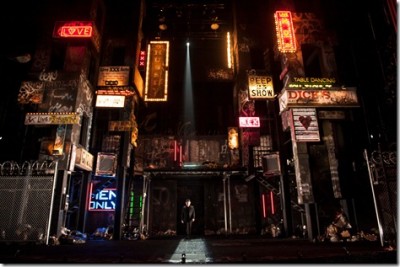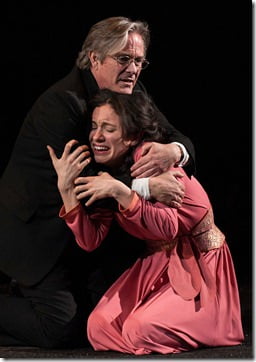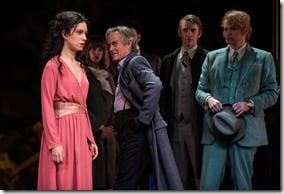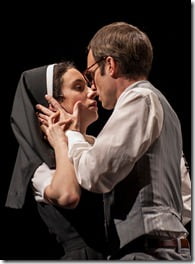Measure for Measure at the Goodman Theatre
Directed by Robert Falls
Presented at the Goodman Theatre
Robert Falls’s sordidly sadomasochistic production of Measure for Measure chills the blood.
It was once considered fashionable to think Shakespeare’s Measure for Measure an allegory of the Christian soul, the Duke’s return to Vienna thought analogous to Christ’s second coming and his proposal to the virtuous Isabella marking the soul’s redeemed ascendency. For those inclined to believe such niceties, Robert Falls’s boldly transgressive production of Shakespeare’s “problem play” is probably not for you. “Abandon all hope, ye who enter here” might as well be etched above the proscenium arch. But for those still willing to make the descent, this visceral and well-paced production nonetheless has certain redeeming virtues.
Falls’s Vienna is a gritty 1970s New York, awash in sordid neon lights and cheap placards selling table dances. It’s a world where set designer Walt Spangler’s tagged and dilapidated skyscrapers are the only thing any higher than the gutter. The Duke (James Newcomb), whom we first see sitting at the edge of a bed, fumbling anxiously with a pistol, has reached his limits. He thus opts to retire from the city for a while, leaving his deputy Angelo (Jay Whittaker) in charge.
Yet Angelo approaches the problem of Vienna’s impending moral collapse with all the repressive authority of a bureaucrat on the rampage. Sentencing young Claudio (Kevin Fugaro) to death for pre-marital fornication with his fiancée, Juliet (Celeste M. Cooper), Angelo will not be persuaded to have mercy. Unless, of course, Claudio’s sisters Isabella (Alejandra Escalante), a novice nun, agrees to sleep with him. Aided by a priest—in truth, the Duke in disguise—and by the rakish flaneur, Lucio (Jeffrey Carlson), Isabella must find a way both to save her brother Claudio and to free Vienna from Angelo’s fanatical grip.
With Nature a debased cesspool and God alarmingly silent, the relevant question in any production of Measure for Measure is “Where does moral authority lie?”Falls thankfully avoids an over-simplified answer to this question. No single character encapsulates the play’s moral center. Instead, each is afforded only a partial morality in direct proportion to their suffering. For abjection is Falls’s most strident virtue in Measure for Measure, and his characters never seem more “good” to us than when they are stretched painfully across the crucible—Isabella at the hands of Angelo, Angelo at the hands of the Duke, the Duke at the hands of no one…or so he thinks. Falls thus places his characters in a deplorable position, perhaps not unlike our own—one in which the only truly moral response to depravity, sin and disgrace is a passive endurance. Claudio is thus Falls’s most moral character, consigned as he is to suffer in prison, entirely reliant on the mercy of others.
As the repressed bureaucrat, Angelo, Jay Whittaker is always on the verge of some terrifying self-revelation, as though having just discovered his darker side for the first time. Whittaker’s performance is thus uncomfortably endearing, as Angelo suffers most under his own stringent authority. And as the novice, Isabella, Alejandra Escalante is fearlessly commandeering, even to the point of compromising some of her vulnerability. Pushed too hard, Isabella starts to sound as aggressively fundamental as her assailant, Angelo; the trick is to show us equally all the places in which Isabella doubts herself fiercely.
James Newcomb’s turn as the Duke is nuanced and well-executed. Capturing the character’s tendency to psychically self-inflate, Newcomb’s Duke wrongly believes himself a Prospero, masterfully orchestrating a comic resolution he can’t, in fact, completely control. A tad emotionally bipolar, the Duke moves convincingly between manic excitement and fearful paralysis, all the while evincing a man never quite convinced of his own abilities.
Thus with a remarkable eye for Shakespeare’s darker tonalities, Falls’ Measure for Measure is wickedly smart even as it seemingly pulls our inner moral compasses all which ways. As beautifully constructed as it is intellectually evocative, it comes highly recommended.
HIGHLY RECOMMENDED
Anthony J. Mangini
Running time is 2 hours and 30 minutes with one intermission.
Measure for Measure runs until April 14th, 2013. The Goodman Theater is located at 170 N. Dearborn St., Chicago, IL 60601. Tickets can be obtained through their box office at (312) 443-3800.





